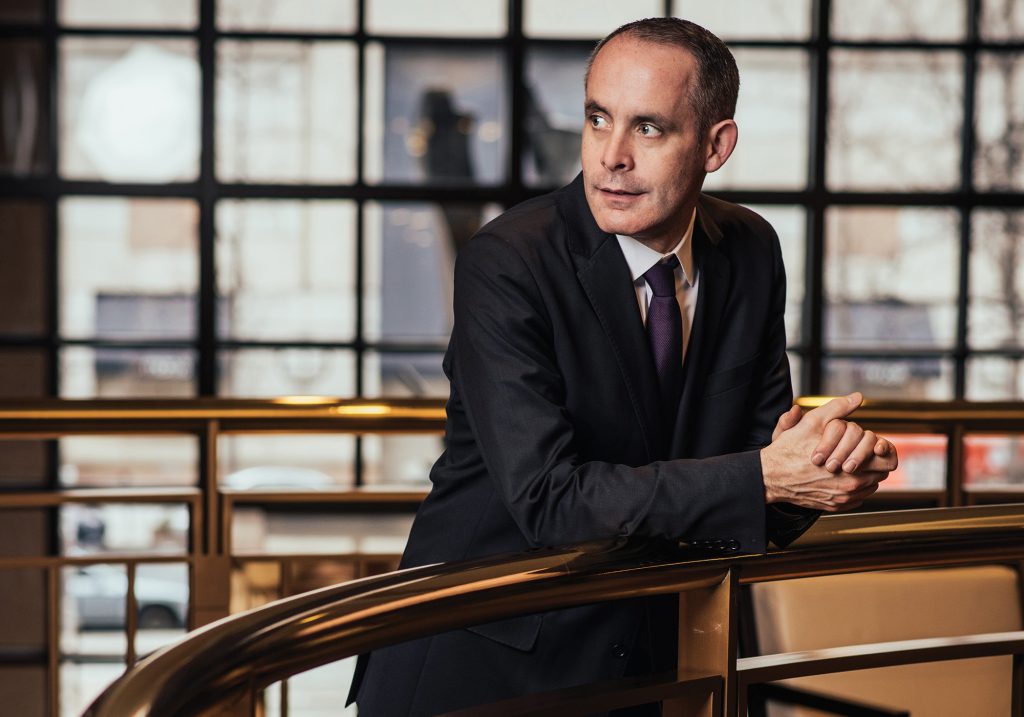Lance Wade ’02 and former Theranos CEO Elizabeth Holmes have a common cause. He is co-leading a five-person Williams & Connolly legal team defending the medical-testing executive accused of defrauding investors of millions of dollars.
In his opening statement in San Jose federal court on September 8, Wade said that “the reality of what happened at Theranos is far, far more complicated than what you have heard about Elizabeth Holmes so far. Far more human and real and oftentimes far more technical and complicated and boring.”
Holmes, a 37-year-old Stanford University dropout who attained celebrity status for her historic rise in Silicon Valley’s entrepreneurial ecosystem, has pleaded not guilty to 12 counts of wire fraud and conspiracy to commit wire fraud.
The charges stem from allegations that she and her former collaborator and romantic partner Ramesh “Sunny” Balwani—who was also indicted and is being tried separately—made false claims to investors, doctors, and patients about their life science firm’s blood-testing technology and the accuracy of its test results.
The case has attracted wide attention for a variety of reasons, among them the rarity of a legal reckoning of this kind in a startup culture that’s built on big-money risk-taking and devil-may-care excess. Billions are made and lost; Theranos, for example was valued at $9 billion when it dissolved, but not before it made Holmes for a time the world’s youngest self-made female billionaire, according to a New York Times report.
Government prosecutors contend that Holmes intentionally lied and cheated. Wade and his defense team is pointing a finger at Balwani, who, they say, took advantage of her naivete—she was 19 when she left Stanford to start the company—and was psychologically and emotionally manipulative. Holmes’s attorney also argues that Theranos’s essential problem was business obstacles, not a scheme to defraud.
Wade is a top litigator at Williams & Connolly, where he began his career after graduating from BC Law and clerking for Judge Harris L. Hartz of the US Court of Appeals for the 10th Circuit from 2002 to 2003. He has represented and counseled senior government officials, candidates for high office, and current and former CEOs of the world’s largest corporations, according to his law firm profile.
Law360 Pulse identified two of those clients as Henry Nicholas III, former executive of Broadcam Corp., who was accused of stock fraud (charges were dropped), and Wilmington Trust Corp., charged with concealing bad loans (company settled before trial).
Wade’s cases have involved an array of other allegations, including securities fraud, antitrust crimes, insider trading, insurance fraud, bank fraud, money laundering, public corruption, cyber crimes, embezzlement, tax fraud, Foreign Corrupt Practices Act (FCPA) violations, health care fraud, and environmental crimes.
DC Chambers USA has said Wade takes “a dogged approach to cases” and described him as “an excellent client lawyer, a strong advocate, and a creative thinker.”
As he told BC Law Magazine for a profile in 2017, “I have a deep desire to help people through a tremendously stressful time. It can bring a lot of stress on me, but it’s also tremendously rewarding.”


